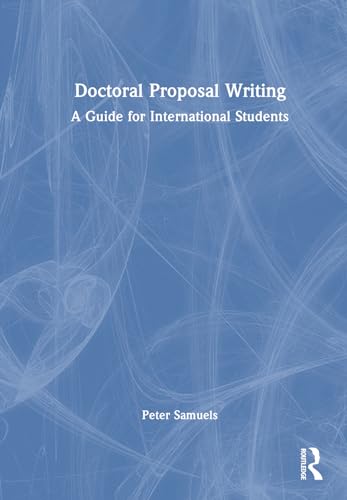
Doctoral Proposal Writing: A Guide for International Students
Peter Samuels
Questions & Answers
International doctoral students face several challenges in writing a research proposal, including language barriers, understanding academic writing conventions, and navigating cultural differences in research methodologies. This book addresses these challenges by:
- Providing real-life examples of proposals by international students, offering insights into common issues and effective solutions.
- Focusing on academic writing development, offering guidance on structure, style, and argumentation, particularly helpful for those whose first language is not English.
- Explaining different types of research and methodologies, helping students choose appropriate approaches for their research.
- Offering advice on managing supervisory relationships, ensuring students understand their roles and expectations.
- Including sections on ethics, data collection, and referencing, crucial for research integrity and credibility.
The book emphasizes the importance of the reader, specifically the academic reviewer, by using the metaphor of a bear eating fish, suggesting that the proposal (the fish) should be appealing and easy to digest for the busy reviewer. Key principles for crafting a proposal that appeals to them include:
-
Clarity and Conciseness: The proposal should be clear, concise, and avoid unnecessary complexity. The use of simple language and straightforward arguments is crucial.
-
Relevance: The topic should be relevant to the academic field and of interest to the reviewer. The proposal should demonstrate a clear understanding of the subject area.
-
Structure: A logical structure with a clear introduction, literature review, methodology, and conclusion helps the reviewer easily navigate the proposal.
-
Evidence-Based Argument: The proposal should present evidence to support claims and avoid subjective language. Proper citation and referencing are essential.
-
Consistency: The proposal should be consistent in style, tone, and argument throughout.
-
Focus on the Reader: The proposal should cater to the reviewer's needs, providing a clear rationale for the research and demonstrating the research's potential impact.
The essential elements of a doctoral research proposal include a title, introduction (with background, problem statement, aim, objectives, and research questions), literature review, project plan, methodology/method, and a reference list. The book guides students by:
- Introduction: Explains the purpose and structure of the proposal, emphasizing the importance of a clear and concise argument.
- Topic Selection: Offers strategies for selecting a suitable research topic and writing the front matter, including the title, aim, objectives, and research questions.
- Literature Review: Provides guidelines for organizing and writing a critical discussion of relevant research, including thematic organization and critical analysis.
- Methodology/Method: Offers a structured approach to writing the methodology section, including research design, philosophy, approach, strategy, data collection, and analysis.
- Academic Writing: Covers principles of academic writing, such as clarity, simplicity, passive voice, and proper citation to avoid plagiarism.
- Ethics and Referencing: Discusses the importance of ethical considerations and provides guidance on referencing and citing sources correctly.
The book integrates academic writing development into the proposal writing process by emphasizing the importance of clear, concise, objective, consistent, and balanced writing. It provides specific guidance on academic writing style, including using the third person, passive voice, avoiding emotive language, and maintaining consistency in number usage. For international students, the book focuses on developing skills like academic writing, argumentation, literature reviews, methodology construction, and evidence usage. It also addresses challenges like plagiarism and the use of AI, offering strategies for summarizing and paraphrasing to avoid plagiarism. The book uses real-life examples and exercises to help international students improve their academic writing and research skills, making their proposals more effective and competitive.
After submitting a doctoral proposal, the next steps include presenting and defending the proposal, planning and managing research, managing supervisory relationships, and focusing on the critical phase of the research. The book prepares students for these challenges by:
- Presenting and Defending the Proposal: It guides students on creating a presentation, understanding the audience, and handling questions effectively.
- Writing Another Proposal: It explains how to address feedback, understand requirements for different audiences, and revise the proposal accordingly.
- Planning and Managing Research: It offers advice on time management, stress management, and maintaining a balance between research and personal life.
- Managing Supervisory Relationships: It discusses different supervisory models, expectations from supervisors and students, and strategies for effective communication.
- Critical Phase of Research: It covers drafting the introduction chapter, conducting a comprehensive literature review, obtaining ethics approval, designing data collection instruments, and more.